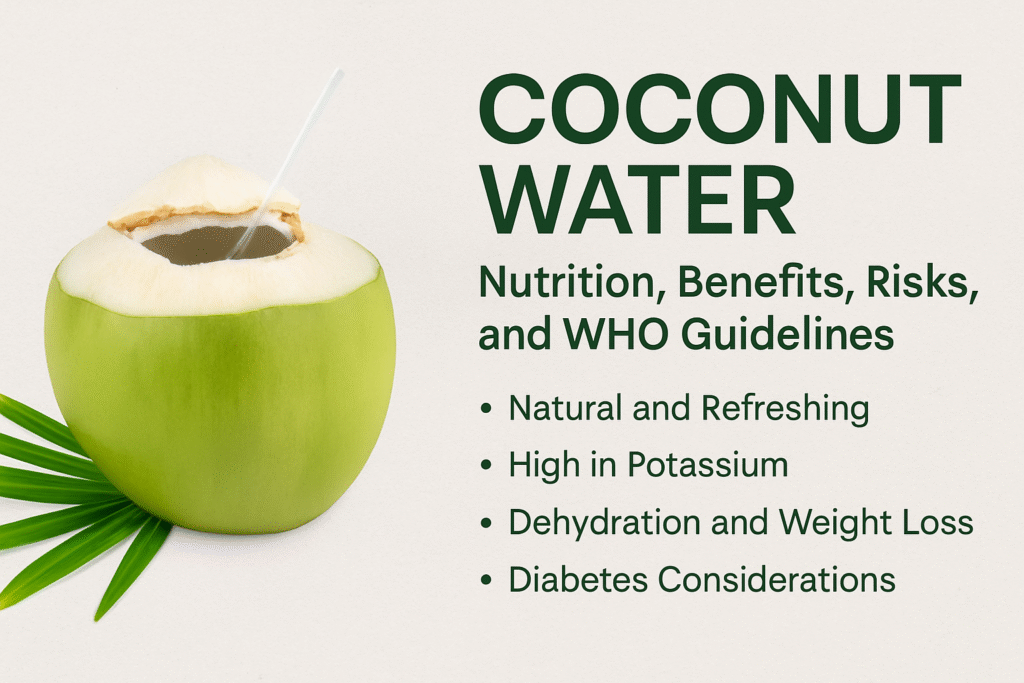Why Coconut Water is Gaining Global Popularity
Coconut water, or nariyal pani as we lovingly call it in India, is the clear, mildly sweet liquid found inside young green coconuts. For decades, it has been sold on Indian streets as a refreshing drink, but in recent years, it has gained massive global recognition.
From celebrities sipping it at the gym to wellness coaches recommending it as a natural sports drink, coconut water has gone from a simple roadside beverage to a billion-dollar industry. But what makes it so special?
Is coconut water truly better than plain water or sports drinks?
Can it replace WHO-recommended Oral Rehydration Solution (ORS) in dehydration cases?
Let’s dive into everything you need to know – from its nutrition profile and health benefits to myths, risks, and WHO guidelines.
Coconut Water Nutrition Profile (Per 240 ml / 1 Cup)
| Nutrient | Amount | Why It Matters |
|---|---|---|
| Calories | ~45 | Low-calorie hydration |
| Carbohydrates | 9–10 g | Natural sugar for quick energy |
| Potassium | 400–600 mg | Essential for blood pressure & heart health |
| Sodium | 60–250 mg | Helps regulate fluid balance |
| Vitamin C | 6–25 mg | Boosts immunity & antioxidant support |
Highlight: Coconut water is high in potassium but relatively low in sodium. That’s great for casual hydration but not ideal for people who sweat heavily or need medical rehydration.
Health Benefits of Coconut Water
1. Hydration and Electrolyte Balance
Coconut water is often promoted as a natural hydration drink. Studies show:
- Plain coconut water hydrates the body as effectively as water.
- Sodium-enriched coconut water works almost like sports drinks in maintaining electrolyte balance after workouts.
Best suited for: light workouts, hot summer hydration, and mild dehydration.
2. Rich in Potassium – Supports Heart Health
One cup of coconut water may contain up to 600 mg of potassium. According to the World Health Organization (WHO), a potassium-rich diet lowers blood pressure and supports heart health.
If your diet lacks fruits and vegetables, coconut water can be a tasty way to improve potassium intake.
3. Gentle on the Stomach
Unlike carbonated or caffeinated drinks, coconut water is soothing and easy to digest. That’s why it’s often given to people recovering from:
- Heat exhaustion
- Travel fatigue
- Mild stomach upset or illness
4. Coconut Water and Weight Loss
Trying to cut down on sodas and packaged juices? Coconut water is your healthier ally. With just 45 calories per cup, it’s much lighter than sugary drinks.
However, remember – it still has natural sugars. Moderation is key.
5. Skin and Detox Benefits
Coconut water hydrates from within and contains Vitamin C and antioxidants that may reduce oxidative stress. Many people swear by its glow-enhancing effect for skin.
SEO Keywords: coconut water skin benefits, coconut water detox
Myths and Misconceptions about Coconut Water
Myth 1: Coconut Water = ORS
Many people assume it can replace Oral Rehydration Solution during diarrhea.
Reality: WHO ORS has precise glucose + sodium balance. Coconut water doesn’t.
Myth 2: Coconut Water is Sugar-Free
Not true. It naturally contains 6–10 g sugar per cup.
Myth 3: Coconut Water Boosts Sports Performance Dramatically
It’s marketed as a “super sports drink,” but for heavy sweating, sodium-rich sports drinks are more effective.
WHO Perspective on Coconut Water and Hydration
- WHO on Safe Drinking Water: Coconut water is safe and natural but cannot replace plain water for daily hydration.
- WHO on ORS: For diarrhea or medical dehydration, only WHO-ORS is recommended. Coconut water may be supportive but not a substitute.
SEO Keywords: coconut water WHO, coconut water ORS
Who Should Drink Coconut Water?
- Casual exercisers (30–60 min workouts)
- People with low potassium intake
- Those living in hot climates
- Anyone wanting a natural, low-calorie drink
Who Should Avoid or Limit It?
- Kidney patients or those on potassium-sparing medicines (risk of high potassium).
- Diabetics – can drink, but in moderation.
- Athletes with heavy sweat loss – may need higher sodium intake than coconut water provides.
How to Choose the Best Coconut Water
- Check the label – Pick 100% pure, no added sugar.
- Look for sodium content – Higher sodium is better for workouts.
- Fresh vs Packaged – Fresh tastes better, packaged lasts longer.
- Watch serving sizes – Many bottles contain 2+ servings.
Smart Ways to Use Coconut Water
- Post-workout refresher: One cup after a light workout.
- Summer hydration: Alternate between water and coconut water.
- Smoothie base: Blend with fruits and yogurt.
- Recovery drink: Sip during mild illness or fever.
FAQs on Coconut Water
1. Is coconut water better than plain water?
For daily hydration, both are fine. Coconut water adds potassium and taste.
2. Can it replace sports drinks?
Yes, for light exercise. No, for intense, sweaty workouts.
3. Is it safe for diabetics?
Yes, but only in moderation. Prefer unsweetened versions.
4. Can it replace WHO ORS?
No. ORS is scientifically formulated.
5. How much is safe daily?
1–2 cups are safe for most. Kidney patients should consult a doctor.
Conclusion
Coconut water is refreshing, naturally sweet, and packed with potassium. It’s a great alternative to sugary drinks and supports hydration, heart health, and weight management.
But remember:
- It’s not a replacement for WHO ORS.
- It’s not a miracle superdrink, but a healthy supportive choice.
Best Tip: Enjoy 1–2 cups daily as part of a balanced lifestyle. Your body (and taste buds) will thank you.
You can read here how to maintain healthy diet – https://newsarmour.com/healthy-diet-routine-daily-guide/
Sources
Mayo Clinic – Coconut water: Is it super hydrating?
🔗 https://www.mayoclinic.org/healthy-lifestyle/nutrition-and-healthy-eating/expert-answers/coconut-water/faq-20207812
Ohio State Health – Is coconut water healthy?
🔗 https://health.osu.edu/wellness/exercise-and-nutrition/is-coconut-water-healthy





